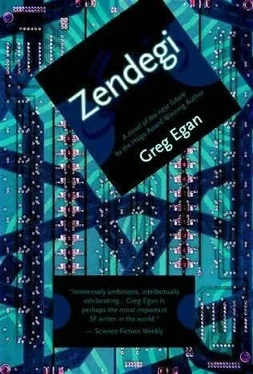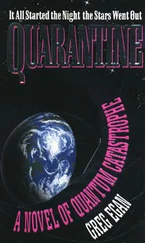Martin opened the door. Omar saw him and pressed his fist into his mouth, stifling a guffaw, but he regained his composure rapidly.
‘Car keys,’ he demanded. Martin handed them over.
‘My fe-riend will be-ring you ca-lothes,’ Omar stuttered, battling his way through the English tongue-twisters.
Shokouh picked up the crutches that were leaning against the sink. ‘Merci,’ she whispered.
‘Bonne chance,’ Martin replied.
He closed the door and stood in the dark, listening to the sound of the crutches as she moved down the corridor, hoping the hospital’s cleaners wouldn’t start their shift before dawn.
‘Guardian Council member Mr Hassan Jabari,’ Behrouz translated, ‘left hospital today after recovering from injuries sustained in a car accident three nights ago. Police have interviewed the driver of the other vehicle, but found that nobody was at fault.’ He turned away from his computer screen to see how Martin was taking the press release.
‘No appeal for witnesses?’ Martin replied, struggling to concentrate. Their cramped office in the outskirts of Tehran sat directly over a bakery; three or four times a day the aroma wafting up from the ovens became impossible to ignore.
‘Apparently not. I expect they got everything they needed from YouTube.’
Martin smiled. YouTube was blocked in Iran, but Shokouh’s Paris interview, along with the anonymous bystander’s movie of the crash scene, had been posted on dozens of other websites. Each time the official blacklist was updated to screen them out, the files turned up somewhere else. Internet download speeds in Iran were severely limited – by law, not by infrastructure – but in the past twenty-four hours Martin hadn’t met a single adult Tehrani who had not seen both movies.
So far, though, the government hadn’t blinked. Martin had phoned three different ministries seeking a comment, but nobody was willing to go on the record, not even to denounce Shokouh’s words as slander. ‘Do you seriously expect an official statement every time a prostitute claims to have a politician as a client?’ one bureaucrat had demanded incredulously.
‘What about the movie of the crash site?’ Martin had pressed him. ‘Doesn’t that support her version of events?’ Martin had briefly contemplated trying to track down the paramedics – whose faces were pixellated-out in the public version – but he’d decided he had no right to compound the dangers they already faced.
‘If such a movie exists, it’s a Zionist forgery.’
‘Can I quote you on that?’ Martin had warmed to this conspiracy theory, but it needed a bit more work. Maybe Shokouh could be portrayed as a Mossad agent who had made the ultimate sacrifice, purely for the sake of embarrassing the Iranian regime. Or, as it turned out, not quite the ultimate sacrifice, which only compounded the embarrassment.
In the absence of a black ops extraction team with helicopters and night-vision goggles, Omar had managed to get Shokouh a doctored passport and a second fake husband – this one to escort her from the country and take the focus off her own documents. That she’d made it through the airport at all suggested that the ‘cousin’ at the hospital had been acting for Jabari alone; VEVAK, mercifully, appeared to have dozed through the whole thing.
Martin’s phone chimed. There was a message from Kambiz, a student he’d met in the run-up to the election; it read ‘Please go to Ferdowsi Square.’
Downstairs, people were lined up outside the bakery for the lunchtime rush, men and women in separate queues. Some carried their stacks of flatbread from the serving window to a cooling table, compounding the olfactory lure. When Martin slowed down to savour the smell, Behrouz grabbed his elbow and tugged him through the crowd towards the alley where their car was parked.
They reached Ferdowsi Square just as the demonstration was getting underway. About thirty young men and women had gathered on a grassy traffic island around a statue of the famous poet. They were holding up signs, all bearing the same slogan: haalaa entekhaab-e-taazeh! Martin had no trouble reading Persian script when the calligraphy wasn’t overly ornate – the alphabet was almost the same as Urdu – and in this case the individual words could not have been more familiar: New Election Now!
The signs themselves offered no English translation; though that might have made for wider coverage in the Western media, it would have opened up the protesters to accusations that they were British or American stooges. Nor was there any reference to Jabari to attract charges of defamation. But the slogan appeared to have hit the right note; Ferdowsi Square was one of the busiest roundabouts in the city, and most of the passing drivers were honking and cheering over the roar of the traffic.
Martin spotted Kambiz, but when their eyes met the young man looked right through him; Martin respected his wish not to be singled out as the reason a foreign journalist was here. There were no police yet, and only one other reporter – Zahra Amin, from the reformist weekly Emkaanha – but Kambiz wouldn’t need to be paranoid to worry that there might be informers among the demonstrators themselves. Martin headed for the opposite side of the group to Zahra, to avoid having to compete with her for interviews. He and Behrouz approached a young, plainly dressed woman and introduced themselves. Her name was Fariba; she was studying engineering at Tehran University. Martin asked her permission to record the interview on his phone; he no longer carried a separate audio recorder. She baulked at first, until he showed her the controls and satisfied her that he would not be recording vision.
‘You’re calling for a new election,’ Martin began. ‘What was wrong with the one you’ve just had?’
‘Two thousand candidates were banned from taking part,’ Behrouz translated. ‘That’s not a fair election. People wanted to vote for many of those candidates, but they didn’t have a chance.’
‘But isn’t it too late to complain now? Wouldn’t it have been better to protest before the election?’
‘We did protest! We were ignored. The government didn’t listen at all.’ As she spoke, Martin kept his eyes on Fariba’s face and paid close attention to her tone of voice, letting Behrouz’s unimpassioned words seep into his mind through a separate channel.
‘So what conditions are you calling for, if a new election is held?’
‘It must be open to anyone who wishes to stand. The approval of the Guardian Council should not be required.’
‘But isn’t that role written into the Constitution?’ Martin asked. ‘It can’t be discarded overnight.’
Fariba hesitated. ‘That’s true, but the Guardian Council should make a commitment to do their job impartially and only disqualify real criminals, instead of everyone with different political ideas. That would be a gesture of good faith, a way of showing that they trust their own people. We’re not children. They’ve put themselves above us, but they are not above us. They’re ordinary people, no better than anyone else.’
Martin knew better than to press her to comment directly on the Jabari scandal; that last oblique sentence would have to suffice. And while the Western media were, predictably, chortling over Jabari’s indiscretion – Omar’s fondest wish having been granted by everyone from CNN to Saturday Night Live – the political ramifications of the phrase they are not above us had a potential life that stretched far beyond Jabari’s fifteen minutes of fame.
Martin thanked her, and went on to seek comments from some more of the demonstrators. He was halfway through his third interview, with a goateed accounting student named Majid, when Behrouz broke off in mid-sentence. A green police car had pulled up on the island, one side of the vehicle still protruding into the road, and three uniformed officers disembarked.
Читать дальше











